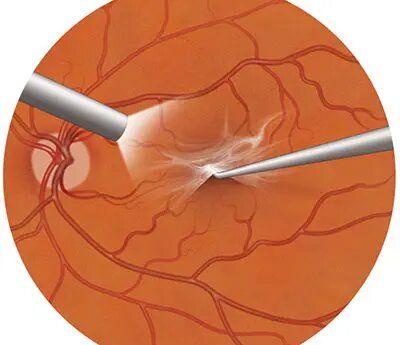Macular pucker, also known as epiretinal membrane, develops when your macula develops creases, wrinkles, or bulges. To function effectively, the macula must be flat against the back of your eye. Your central vision is impacted when the macula wrinkles or bulges.
Things can appear wavy when you have macular pucker, and you could struggle to perceive fine details. Your central vision may appear to have a grey, foggy, or blank spot in it. Straight lines may even appear crooked or wavelike in your centre vision if you have waviness there. Your side vision is unaffected by macular pucker.
Age is the most common cause of macular pucker. The vitreous begins to shrink and pull away from the retina as you get older. The vitreous typically separates without any issues. However, the vitreous can occasionally adhere to the retina. The retina and macula wrinkling or bulging as a result of scar tissue formation.
The most frequent risk factor for macular pucker is ageing. A macular pucker can also occur in people with other vision issues. These issues consist of when the eye’s vitreous pulls away from the retina, it results in posterior vitreous detachment, detached or torn retina, internal eye swelling, prior eye surgery, severe injury-related eye damage, and issues with the retina’s blood vessels
In order to dilate (widen) your pupil, your ophthalmologist will inject drops into your eye. This enables them to view the interior of your eye using a specific lens.
After that, they will use optical coherence tomography (OCT) to capture photographs of your eye. A device scans the retina of your eye using OCT. The retina and macula are seen here in incredibly fine detail. These photos are examined by your ophthalmologist to look for issues.
Your symptoms will determine how you are treated. You may not need therapy if your symptoms are minor. Instead, to improve your eyesight, your ophthalmologist may alter the prescription for your glasses or contact lenses. When focusing on something up close, you may decide to use bifocals. When you have macular pucker, neither eye drops nor medications nor laser surgery can improve your eyesight. However, if you have any of the other diseases listed above, your ophthalmologist might recommend these treatments.
A procedure called a vitrectomy may be suggested by your ophthalmologist if your symptoms are more severe. A portion of the vitreous and scar tissue on your macula will be removed by your ophthalmologist. The macula is flattened and placed back in its correct position as a result. It is conceivable that your vision will gradually get better. Your vision might not be as clear as it was before to macular pucker, though.
As with any surgery, vitrectomy carries some hazards. They include bleeding in your eye, eye infection, a detached retina (where the retina lifts away from the back of the eye), Having the macular pucker happen again and cataract when the lens in your eye becomes cloudy
Your ophthalmologist will talk about these risks and how vitrectomy surgery may help you.
At The Eye Center- Dr. Mahnaz Naveed Shah & Associates our team of eight ophthalmology subspecialists/ eye specialists, eye surgeons who are considered amongst the very best eye specialists in Karachi and in Pakistan, have the diagnostic and treatment capabilities to treat from the simplest to the most complex patients. We work hard to provide our patients with the best possible medical and surgical eye care, in a state of the art purpose built eye care facility. We offer the entire array of medical, laser and surgical treatments to help provide patients the best possible care in the most efficient, safe and ethical manner.
If you need an appointment, please contact us at 03041119544 during our working hours or leave us a WhatsApp message at +923028291799 and someone will connect with you. Walk-in appointments are also available for emergencies. We can also be reached through our web portal on www.surgicaleyecenter.org


